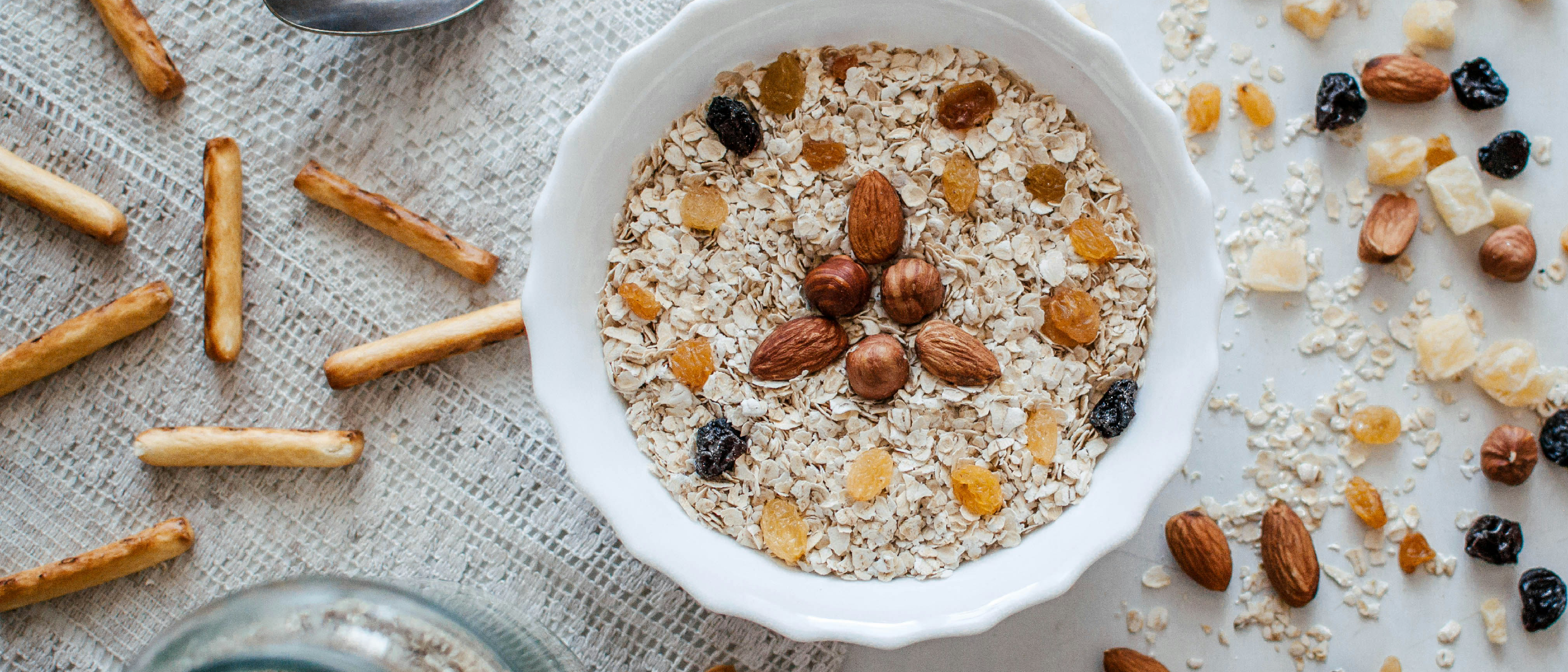What Happens to Your Body When You Eat Oatmeal Every Day
Posted on May 2, 2025 • 4 min read • 686 wordsDiscover how daily oatmeal consumption lowers LDL cholesterol through β-glucan fiber, stabilizes blood sugar levels, and nourishes gut microbiota. Learn why whole-grain oats support weight management and provide essential nutrients, backed by nutritional research.

Oatmeal, a staple in many healthy diets, has long been celebrated for its nutritional density and versatility. But beyond being a cozy breakfast option, what exactly happens to your body when you make oatmeal a daily habit? Drawing from research on plant-based diets, metabolic health, and gut microbiome dynamics, let’s explore the physiological benefits of incorporating oatmeal into your routine.
1. Cholesterol Management: A Natural Shield for Heart Health
One of oatmeal’s most well-known benefits is its ability to lower LDL (“bad”) cholesterol—a key risk factor for heart disease. This effect is primarily driven by β-glucan, a soluble fiber unique to oats. β-glucan forms a gel-like substance in the digestive tract, binding to bile acids (which contain cholesterol) and promoting their excretion. To replenish these acids, the liver pulls cholesterol from the bloodstream, effectively lowering LDL levels [1] .
This aligns with broader research on plant-based diets, which emphasizes the role of fiber-rich foods in reducing cardiovascular risk. A 2024 study on metabolic syndrome, for example, highlighted that diets high in soluble fiber are associated with lower remnant cholesterol (a marker of heart disease risk), further reinforcing oatmeal’s heart-protective potential [2] .
2. Blood Sugar Regulation: Steadying the Glucose Rollercoaster
For individuals managing blood sugar levels (e.g., those with prediabetes or type 2 diabetes), oatmeal’s slow-digesting nature is a game-changer. The β-glucan in oats slows the absorption of glucose, preventing rapid spikes and crashes in blood sugar. This helps maintain insulin sensitivity—critical for metabolic health.
A 2024 study on high-selenium-induced insulin resistance noted that dietary interventions promoting stable glucose levels (like fiber-rich foods) can mitigate insulin resistance [3] . While not directly about oatmeal, this underscores the importance of foods that support steady glucose levels—exactly what oatmeal delivers.
3. Gut Health: Nurturing a Thriving Microbiome
The gut microbiome, a community of trillions of bacteria, plays a role in digestion, immunity, and even mental health. Oatmeal’s fiber acts as a prebiotic, feeding beneficial bacteria like Bifidobacterium and Lactobacillus. These microbes produce short-chain fatty acids (SCFAs), which reduce inflammation and support gut barrier function.
Research on sustainable diets and mental health (Elsner et al., 2023) emphasizes the link between dietary fiber and a diverse microbiome, noting that fiber-rich diets promote resilience in gut communities [4] . Oatmeal, as a fiber-dense food, fits perfectly into this framework, fostering a healthier gut environment.
4. Weight Management: Staying Full, Longer
Feeling satisfied between meals is key to maintaining a healthy weight, and oatmeal excels here. Its combination of fiber, protein, and complex carbs creates a prolonged sense of satiety. The β-glucan in oats slows stomach emptying, keeping you full for hours and reducing the urge to snack on high-calorie, nutrient-poor foods.
This aligns with findings from studies on dietary interventions for children and adolescents, where fiber-rich diets were linked to lower rates of obesity and better weight control [5] . Oatmeal’s satiating properties make it an ideal choice for those aiming to manage their weight.
5. Nutrient Boost: Fueling Your Body With Essentials
Oatmeal is a nutritional powerhouse, packed with vitamins, minerals, and antioxidants:
- B vitamins: Support energy production and brain function.
- Iron: Aids in red blood cell formation, preventing fatigue.
- Magnesium: Regulates blood pressure and muscle function.
- Antioxidants (avenanthramides): Reduce inflammation and oxidative stress.
Even young and mature rhizomes of Polygonatum sibiricum (a plant studied for its polysaccharides) are valued for their antioxidant properties, but oatmeal offers these benefits more accessibly in daily meals [6] .
Conclusion: Oatmeal as a Daily Health Investment
Incorporating oatmeal into your daily diet sets off a chain of positive effects: from lowering cholesterol and stabilizing blood sugar to nurturing your gut microbiome and keeping you full. While individual results may vary, the science consistently positions oatmeal as a cornerstone of a healthy diet.
To maximize benefits, opt for minimally processed oats (e.g., steel-cut or rolled oats) over flavored varieties with added sugars. Pair them with fresh fruit, nuts, or seeds to boost fiber and nutrient intake further.
So, the next time you stir a bowl of oatmeal, remember—you’re not just eating breakfast; you’re investing in your long-term health.
Sources
-
Ghammachi N, Dharmayani PN, Mihrshahi S, Ronto R. Investigating Web-Based Nutrition Education Interventions for Promoting Sustainable and Healthy Diets in Young Adults: A Systematic Literature Review. International Journal of Environmental Research and Public Health 19:2339.(2022). doi:10.3390/ijerph19042339 ↩︎
-
Li F, Yuan H, Cai S, Piao W. Association between Remnant Cholesterol and Metabolic Syndrome among Chinese Adults: Chinese Nutrition and Health Surveillance (2015-2017). Nutrients 16:1590.(2024). doi:10.3390/nu16101590 ↩︎
-
Zhan S, Wang J, Zhu M, Liu Y. The Inhibitory Effects of NCT503 and Exogenous Serine on High-Selenium Induced Insulin Resistance in Mice. Nutrients 17:123.(2025). doi:10.3390/nu17010123 ↩︎
-
Elsner F, Matthiessen LE, Średnicka-Tober D, Marx W. Identifying Future Study Designs for Mental Health and Social Wellbeing Associated with Diets of a Cohort Living in Eco-Regions: Findings from the INSUM Expert Workshop. International Journal of Environmental Research and Public Health 20:105.(2023). doi:10.3390/ijerph20010105 ↩︎
-
Yang Y, Li Y, Yuan H, Tang Z. Hypertension-Related Status and Influencing Factors among Chinese Children and Adolescents Aged 6~17 Years: Data from China Nutrition and Health Surveillance (2015-2017). Nutrients 16:1234.(2024). doi:10.3390/nu16081234 ↩︎
-
Sun C, Wang G, Sun J, Yin J. A New Method of Extracting Polygonatum sibiricum Polysaccharide with Antioxidant Function: Ultrasound-Assisted Extraction-Deep Eutectic Solvents Method. Foods 12:3582.(2023). doi:10.3390/foods12183582 ↩︎